The third in a five-part series highlighting Indiana University’s role in the first World War. Part I ; Part II
IU students and alumni served in both military and non-military ways during the war; the following details just a few of their stories.
Elder Watson Diggs
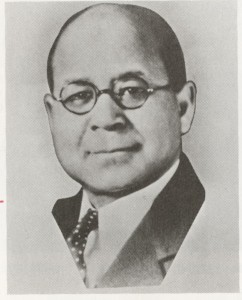
Lieutenant Elder Watson Diggs attended Indiana University from 1911-1916. As an IU student, he was one of the principal founders of Kappa Alpha Psi, a historically African American fraternity. Following his graduation in 1916, he served as the principal of public schools in Bloomington, Vincennes, and Indianapolis.
During the First World War, he served with the Expeditionary Forces in France. Nicknamed the Buffalo Soldiers, Diggs’ division, the 92nd, saw active service in the front line trenches on the western front in France in the Vosges Mountains, the Argonne Forest Offensive, and at Metz, according to a letter he wrote to the IU’s Committee on War Work. He returned to the United States after six months overseas and was formally discharged on April 1, 1919.
Horace Goff
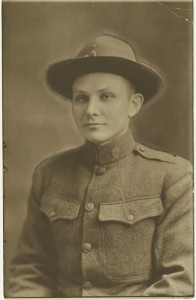
Born in Middletown, Indiana, Horace Porter Goff attended Indiana University between 1912 and 1918, earning a degree in Chemistry. In December 1917, during the semester break of his senior year, he voluntarily enlisted in the United States Military at the age of twenty-eight.
Goff left for Columbus, Ohio, on December 13 to commence military training. “I now feel like a full-fledged soldier,” he wrote to his parents and brother. “My squad received their uniforms, fingerprints, and inoculations.”
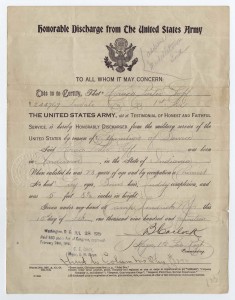
From Columbus, he was moved to Washington D.C. and Maryland before being sent overseas to France. Goff was assigned to the 30th Gas and Flame Engineer Regiment of the Regular Army. He had hoped that he would be employed as a chemical engineer to produce and analyze gases, but instead served as part of the gas unit on the Western Front.
Goff served in France for just over a year, until he was discharged in February, 1919. He died in 1936, possibly as a result of his prolonged exposure to mustard gas.
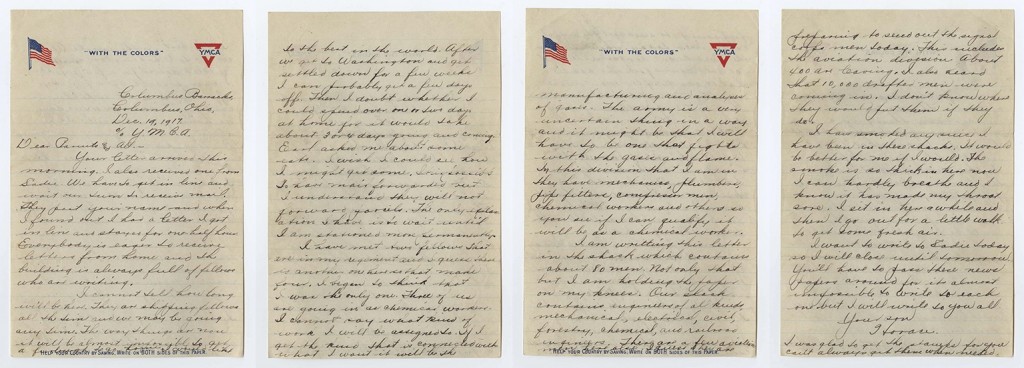
[View all of Horace Goff’s paper online, digitized by the University Archives.]
Louise Stubbins
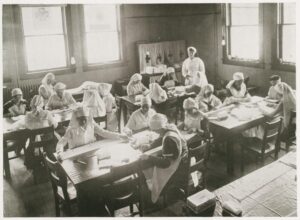
Besides training as soldiers, IU students helped out with humanitarian efforts. In May 1917, IU student Louise Stubbins (’19) and Assistant Professor of Home Economics Elizabeth Sage traveled to Chicago in order to take a course in the making of surgical dressings. Upon their return to Bloomington at the beginning of the summer session, they taught a Red Cross course to university students and local women on how to prepare gauze dressing and bandages for overseas hospitals. In November of 1917, a Red Cross Workshop opened in room four of Kirkwood Hall and was eventually expanded to accommodate up to one hundred fifty women at one time to produce thousands of bandages. White aprons and white caps were the required uniforms.
Ernest Bicknell
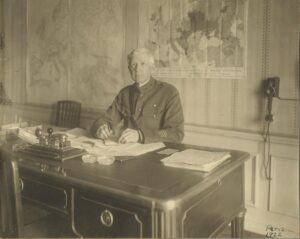
IU connections to the Red Cross extended the national level. Ernest P. Bicknell, a 1887 graduate of Indiana University, was named National Director of the Red Cross in 1908. During the war, Bicknell served as Deputy Commissioner to France, Commissioner to Belgium, and Special Commission to the Balkan States, as well as serving as a member of several international relief organizations. His scrapbooks provide an in-depth view of his time in the Red Cross.
The end of the war meant even more work for Bicknell as the Red Cross sought to provide aid to those who had been displaced and impoverished by four years of conflict. He was named Red Cross Deputy Commissioner to Europe in 1919 and then promoted two years later to Commissioner to Europe. He went on to serve as the Director of the Rockefeller Foundation War Relief Committee as well as the Office for Insular and Foreign Operations.
[Visit the University Archives to see all of Ernest Bicknell’s scrapbooks and papers.]
Leave a Reply